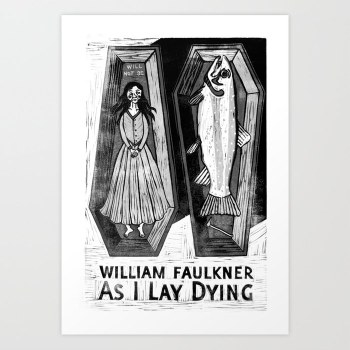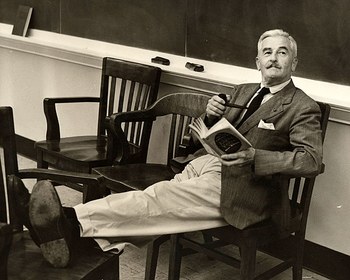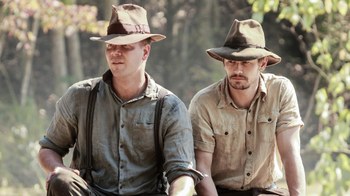As I Lay Dying: a literary case of breakdown and break-through
Zoe Tsaousaki
Faulkner’s As I Lay Dying could be described as an ode to human strength, the inexplicable force driving people through the tragicomic continuum of life. All characters experience loss and naturalistic determinism. However, Darl Bundren’s endurance is admirable and bound to guarantee preeminence throughout the novel. His prevalence is obvious in the way he speaks the unutterable, using meaningful, exceeding language; neither his incoherent family nor the alienating society can perceive the worldliness of his survival. His final confinement to the asylum of Jefferson is inadequate to cancel the impressive persona Faulkner conceived.
1. Language as a way to differentiate characters
2. The difficulties of Darl's life
3. Darl's relationship with family and the motherly figure
4. Accused and betrayed by his family
5. Inside Darl's mind
6. Conclusions
7. Works Cited
1. Language as a way to differentiate characters
Faulkner’s As I Lay Dying could be described as an ode to human strength, the inexplicable force driving people through the tragicomic continuum of life. All characters experience loss and naturalistic determinism. However, Darl Bundren’s endurance is admirable and bound to guarantee preeminence throughout the novel. His prevalence is obvious in the way he speaks the unutterable, using meaningful, exceeding language; neither his incoherent family nor the alienating society can perceive the worldliness of his survival. His final confinement to the asylum of Jefferson is inadequate to cancel the impressive persona Faulkner conceived.
At the outset, Faulkner’s mastery of words is mostly demonstrated in Darl’s passages. Bleikasten fairly speaks of “[a]n extremely resourceful and flexible style”, occasionally conditioned by “remarkable sobriety and objectivity” (Faulkner, 2012:34). When, for instance he comments on his father’s idleness, there is robust evidence of the critical processing of facts along with astuteness of irony. Further on, in the novel, the character describes departed Addie’s “peaceful, rigid face fading into the dusk as though darkness were a precursor of the ultimate earth, until at last the face seems to float detached upon it, lightly as the reflection of a dead leaf.” (Faulkner, 2012:715).
As Bleikasten continues, “[t]he sentences are more varied and gain in length and complexity” (Faulkner, 2012:34); Darl’s quoted description is an accurate example of this idea, as the subordinate structures are introduced. Nonetheless, a prevalent poetic nature is obvious. Unfortunately, this peculiar way of confronting emotions is proved insufficient, considering the magnitude of the tragedy he is found involved in. As compared to the extensive parts of vernacular, Darl Bundren’s sections could be called redemptive for modernist concerns.
In fact, he describes Tull’s wagon by means of some colorful, impressionistic fashion (Faulkner, 2012:714) and inserts the concept of cubism, in an analogy of the coffin lying on the sawhorse (Faulkner, 2012:777). He also refers to “[t]wo figures in a Greek frieze, isolated out of all reality by the red glare” (Faulkner, 2012:778) employing both the reader’s classical knowledge and active perception in a single phrase. Moreover, the characteristic description of Jewel as “[s]uddenly aghast into silence by his own noise” (Faulkner, 2012:703) is an antithetic acoustic image that epitomizes the use of modernist language. Darl surely exceeds in this field, while other characters are suffocated by their own boundaries within the code.
2. The difficulties of Darl's life
Another major idea is Darl’s endurance. It is partly supported by the fact that his insight allows access to information and behaviors cunningly concealed; he also acts outspokenly and confronts his siblings. Dewey Dell’s pregnancy, Jewel’s fierce feelings towards Addie or even the scene of her death are discussed or described by him. In The return of the repressed, Fowler writes: “Similarly, Darl invades Dewey Dell’s secret and confronts her with her own buried desire: ‘You want her to die so that you can get to town; is that it?’” (Faulkner, 2012:711). He also keeps repeating that “Addie Bundren is going to die”, upsetting Jewel, who, in most cases, ends up cursing (Faulkner, 2012:731).

Furthermore, Darl’s existential questions should be taken into serious account; he has the courage to be reduced to repetitive alternations of the verb “to be”. Not only he suffers from an identity crisis, but is brave enough to conclude to the unsettling acknowledgement “I don’t know if I am or not” (Faulkner, 2012:726). Consequently, he has been tentatively carrying many more burdens to Jefferson, along with his mother’s corpse. Darl’s clairvoyance has inspired great hatred on behalf of his family (Slatoff, 1960:165).
Addie, however, has specific reasons for rejecting him. Suggesting that he is a son of Anse’s and not of hers, she links Darl’s existence to the patriarchal doctrine that vainly tried to domineer her life. As a result, Darl not only did experience the lack of maternal affection but also his marginalization that goes back to his birth. What is more, the mother’s special treatment of Jewel has led Darl to the realization that “Jewel is, so Addie Bundren must be.” (Faulkner, 2012:726); Darl has therefore understood the recurring idea in her mind, that her illegitimate son is more connected to what one considers the “self”. Addie is for Darl an ever absent living mother that continues to trouble his mind as an ever present haunting figure.
3. Darl's relationship with family and the motherly figure
“We hear her turn over on her side” (Faulkner, 2012:775), Darl says, accepting Addie’s in-between state. Neither alive, nor dead, she reminds him how much of a burden he was. Gresset argues: “Reality in As I Lay Dying is not so much the death of the mother but the living presence of the dead mother. The dead mother is: this is demonstrated by the reactions her death provokes in each member of her family” (Faulkner, 2012:220). Moreover, his juxtaposition with Jewel is emphasized.
The younger son is the apple of Addie’s eye (Faulkner 704), whereas Darl is an unlucky visitor. The character has therefore been perceived in such ways that do not allow the actual passing of his mother; the basic motif of remembrance often reappears, torturing and perplexing Darl’s life. The chief rival in the plot is Darl’s brother Jewel; connected with the horse, he is associated with energy and action and is presented as an opposite of Darl, who moves into a state of inertia. Yale professor Wai Chee Dimock states: “I think Darl and Jewel as symmetrical in that sense. Jewel has given the thing that is most monetarily valuable. And Darl has given up the thing that is most humanly valuable”, stressing another dimension of their difference. Jewel’s existence is always characterized as wooden, referring to the two brothers’ alienation and damaged relationship.
Their destroyed sense of brotherhood is an outcome of Darl’s enhanced perception and has also been characterized as a rivalry to sonhood. Faulkner’s anti-hero realizes Jewel’s obsession over Addie and constantly attacks him. “Jewel, I say, she is dead, Jewel. Addie Bundren is dead” (Faulkner, 2012:716) and “But it’s not your horse that’s dead?” are some of his repeated lines, in an effort to make Jewel recognize his mother as a decayed body in soulless box (Faulkner, 2012:731). Moreover, he is the one to question Jewel’s biological identity: “Your mother was a horse but who was your father, Jewel?” (Faulkner, 2012:774). Outraged Jewel’s reaction can be perceived as two-fold: the noisy riddance of the momentary steam but also a silent commitment to revenge Darl for disturbing his own privacy, as well as Addie’s. As far as Dewey Dell is concerned, she despises the intuitive brother because he has discovered her painful secret.
Fanning her mother continuously and allowing no human interaction, is proof that she has been patiently longing for Addie’s departure. Darl is presented as intelligent enough to grasp the entire plan of abortion: “You want her to die so you can get to town: is that it?” (Faulkner, 2012:711). Dewey Dell’s accumulated hatred is combined with unsettling simplicity of thought: “I don’t know how to worry. I don’t know how to cry” (Faulkner, 2012:718). Presumably these are the desperate woman’s reasons to turn against Darl in the final moment of crisis, when he is betrayed and blatantly accused.
4. Accused and betrayed by his family
That exact moment is when the family ties undergo total dilapidation. Darl is victimized and violently attacked by his siblings. The physical aspect of violence is attributed to the animalistic female character, while Jewel’s threats are forceful and attract more attention. “Kill him. Kill that son of a bitch” is the actual phrase addressing his brother (Faulkner, 2012:785).

Darl, therefore, has endured exclusion and isolation, as a high price for his peculiar power of perception. According to John S. Hardt, the motif of the scapegoat within the family appears to be persistent in As I Lay Dying. In fact, he argues that Darl is incarcerated “[s]o their guilt will be removed, not because he is insane. The question of his insanity is not a concern to the family” (Faulkner, 2012:37). Darl then is even more diminished when his value to the family is presented as lower than the law suit fine. In fact, even the logical character of Cash agrees on the institutionalization of his brother, despite not being sure of the moral implications. “It was either sent him to Jackson or have Gillespie sue us” (Faulkner, 2012:782), he adds, considering the illegality of the action, as well as the social criticism that is about to intensify.
For the idle father, there is no dilemma. He easily selects the money to the condemnation of his child. Jewel and Dewey Dell’s darker reasons have been discussed: Darl is abandoned to confront alone their superficiality and egoism. As expected, he is weaker and banished out of the gathered group called family. During the journey to Jefferson, the Bundrens come across a grotesque series of disasters and events, “[r]ecalling also the Dostoevskian novel in its coarse mix of emotions” (Howe, 1975:176); Darl’s tragedy is also to participate in a tragic quest, face the southern July sun, save his mother’s coffin from an aggressive river and look at the buzzards accompanying the decaying carcass.
His only rebellion that aims in ending his torments is a complete failure. According to Hallgrath, his tenuous state deteriorates by the agony and catastrophes he has to endure, a person with posttraumatic stress disorder or schizophrenia has an entirely different idea of the actual facts (Howe, 1975:10-11). Thus, the harshness of the quest has a most negative impact on his already sensitive mind.
5. Inside Darl's mind
The character’s involvement in these struggles is not the only demonstration of his remarkable perseverance. He refers repetitively to Addie’s vision or Jewel’s wooden eyes fixing him, inserting a recurring modernist motif. Despite not blaming his relatives for this internal crisis, the analyzed persona is put under their inquisitive microscope, which leads to the processing of numerous existential questions and acknowledgment of his inadequacies.Constantly defined by his family, Darl expresses himself in two very different ways: a son who struggles to belong and an eloquent mature mind. The obvious division, exists in the language he uses to converse with other characters and the magnificent words of his thoughts. Both simplistic phrases such as “[t]hat’ll steady it” (Faulkner, 2012:774) and lyrical descriptions coincide in the same passage: “echoes of old compulsions with no-hand on no-strings: in sunsets we fall into furious attitudes, dead gestures of dolls” (Faulkner, 2012:773).

What Darl conceals is that self-perception similar to the surroundings’ image of him. The mental illness forges an unusual perceptive prism that forces self-definition through the others’ idea of Darl’s consciousness. It is therefore prevailed by hostility and authoritative behavior towards his own existence. As Gresset describes, “Darl falls a victim to the tyranny of his own, divided glance having become literally his own voyeur, the voyeur who spies on himself he ends a victim of schizophrenia” (Faulkner, 2012:219).
This concept is obvious in the way Faulkner distinguishes between the “I” of the narrative and Darl as a character towards the last parts: “Darl has gone to Jackson.” (Faulkner, 2012:791) the character summarizes, referring to himself; but even in the very beginning Darl’s studied frame of mind follows the two brothers’ route as if he is not participating in the scene (Faulkner, 2012:698). Darl Bundren, eventually, reveals the origin of his spy-glass, the voyeur’s device he does not manage to escape. The concept of Darl’s prevalence is fully developed in the scene of confinement to the state asylum. At this point, insanity is the main characteristic of his.
Lost in the flux of thoughts, Darl responds with the instinctive affirmation “Yes yes yes yes yes yes” (Faulkner, 2012:791). On a first reading, this answer could be interpreted as the acknowledgement of his state, the mere reality of a justified imprisonment. On the other hand, the laughter that accompanies it could be explained as an indication of mockery. Darl laughs again when he is being handcuffed, reduced to a ‘poor devil’ in ‘the public street.’(Faulkner, 2012:20), Hallgrath states. Darl’s perception may guide him to consider the reasons why he is restricted to the asylum –maybe the matter of nature vis-a-vis his queer case of nurture. Moreover, despite the split consciousness evidence, physical proof of schizophrenia is in the end of the passage, alluding to the idea that Darl’s reflection is reasonable.
The narrator’s report of the facts does not seem false or recorded on the mind of an unstable person (Hallgrath, 2013:21). He defines prevalence by having the courage to laugh at his own demons, may them be his relatives or his own destiny; his confinement is a quite macabre joke, but one that has not completely destroyed the perceptive, courageous man in him. A predominant character and narrator or a brilliant mind like his are not allowed to succumb even to the most unconventional series of tragedies.
6. Conclusions
Faulkner himself recognizes the importance of sacrifice as an aspect of the uplifted soul (Coughlan, 1972:137). Darl’s function as a scapegoat in the novel allows his family to proceed in their vain norms. Nonetheless, he prevents them from experiencing the distress and social damage that he undergoes, despite their total disregard of the character’s thoughts and emotions. Furthermore, Darl is a universal man, one who “is immortal because he will endure” (Coughlan, 1972:137).
His confinement may appear as a dead end, but all he has endured and the ways in which Darl prevails render him an unlimited persona, someone impossible to be constricted; thus, Faulkner’s Darl Bundren is the free voice and immortal soul that the author himself describes in his Nobel Prize speech (qtd. in Coughlan, 1972:137). In a concise conclusion, psychiatrist Ronald Laing can be consulted; he suggests that “[m]adness need not be all breakdown. It may also be break-through. It is potential liberation and renewal as well as enslavement and existential death” (Coughlan, 1972:110). Darl Bundren is throughout the novel an indisputable example of this characterization.
Existential concerns taunt him, while his confinement takes place in practical terms. Nevertheless, the person’s perceptive capacity is liberated and accompanied by astonishing linguistic creation. Although William Faulkner considered himself a poor thinker of psychology, a latter psychiatrist unknowingly disproves him as the sculptor of a most convincing schizophrenic character.
7. Works Cited
Faulkner William, As I Lay Dying, 2012
Bleikasten Andre, Faulkner’s As I Lay Dying, 1973
Coughlan Robert, The private world of William Faulkner,1972
Dimock Wai C., "Faulkner's As I Lay Dying, Part III.” in Amst246: Hemingway, Fitzgerald, Faulkner, 2011
Fowler Doreen, The return of the repressed, 2000
Gresset Michel, Fascination,1989
Hallgrath Neal, The worry that you are yourself: Darl’s unforgivable neurodiversity, 2013
Howe Irving, William Faulkner: A critical Study,1975
Hardt John S., The Scapegoat in Selected Works of William Faulkner, 1976
Laing Ronald D., The politics of experience, 1967
Slatoff Walter J., Quest for failure; a study of William Faulkner, 1960
Foto 1 da society6.com (data di ultima consultazione: 31/08/2021)
Foto 2 da minimaetmoralia.it (data di ultima consultazione: 31/08/2021)
Foto 3 da variety.com (data di ultima consultazione: 31/08/2021)